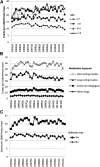Severe Hypoglycemia Requiring Medical Intervention in a Large Cohort of Adults With Diabetes Receiving Care in U.S. Integrated Health Care Delivery Systems: 2005-2011
- PMID: 26681726
- PMCID: PMC4876672
- DOI: 10.2337/dc15-0858
Severe Hypoglycemia Requiring Medical Intervention in a Large Cohort of Adults With Diabetes Receiving Care in U.S. Integrated Health Care Delivery Systems: 2005-2011
Abstract
Objective: Appropriate glycemic control is fundamental to diabetes care, but aggressive glucose targets and intensive therapy may unintentionally increase episodes of hypoglycemia. We quantified the burden of severe hypoglycemia requiring medical intervention in a well-defined population of insured individuals with diabetes receiving care in integrated health care delivery systems across the U.S.
Research design and methods: This observational cohort study included 917,440 adults with diabetes receiving care during 2005 to 2011 at participating SUrveillance, PREvention, and ManagEment of Diabetes Mellitus (SUPREME-DM) network sites. Severe hypoglycemia rates were based on any occurrence of hypoglycemia-related ICD-9 codes from emergency department or inpatient medical encounters and reported overall and by age, sex, comorbidity status, antecedent A1C level, and medication use.
Results: Annual rates of severe hypoglycemia ranged from 1.4 to 1.6 events per 100 person-years. Rates of severe hypoglycemia were higher among those with older age, chronic kidney disease, congestive heart failure, cardiovascular disease, depression, and higher A1C levels, and in users of insulin, insulin secretagogues, or β-blockers (P < 0.001 for all). Changes in severe hypoglycemia occurrence over time were not clinically significant in the cohort as a whole but were observed in subgroups of individuals with chronic kidney disease, congestive heart failure, and cardiovascular disease.
Conclusions: Risk of severe hypoglycemia in clinical settings is considerably higher in identifiable patient subgroups than in randomized controlled trials. Strategies that reduce the risk of hypoglycemia in high-risk patients are needed.
© 2016 by the American Diabetes Association. Readers may use this article as long as the work is properly cited, the use is educational and not for profit, and the work is not altered.
Figures

Comment in
-
Comment on Pathak et al. Severe Hypoglycemia Requiring Medical Intervention in a Large Cohort of Adults With Diabetes Receiving Care in U.S. Integrated Health Care Delivery Systems: 2005-2011. Diabetes Care 2016:39;363-370.Diabetes Care. 2017 Feb;40(2):e25. doi: 10.2337/dc16-0527. Diabetes Care. 2017. PMID: 28108541 No abstract available.
-
Response to Comment on Pathak et al. Severe Hypoglycemia Requiring Medical Intervention in a Large Cohort of Adults With Diabetes Receiving Care in U.S. Integrated Health Care Delivery Systems: 2005-2011. Diabetes Care 2016;39:363-370.Diabetes Care. 2017 Feb;40(2):e26. doi: 10.2337/dci16-0037. Diabetes Care. 2017. PMID: 28108542 Free PMC article. No abstract available.
References
-
- The Diabetes Control and Complications Trial Research Group The effect of intensive treatment of diabetes on the development and progression of long-term complications in insulin-dependent diabetes mellitus. N Engl J Med 1993;329:977–986 - PubMed
-
- Nathan DM. Some answers, more controversy, from UKPDS. United Kingdom Prospective Diabetes Study. Lancet 1998;352:832–833 - PubMed
-
- UK Prospective Diabetes Study (UKPDS) Group Intensive blood-glucose control with sulphonylureas or insulin compared with conventional treatment and risk of complications in patients with type 2 diabetes (UKPDS 33). Lancet 1998;352:837–853 - PubMed
Publication types
MeSH terms
Substances
Grants and funding
LinkOut - more resources
Full Text Sources
Other Literature Sources
Medical

